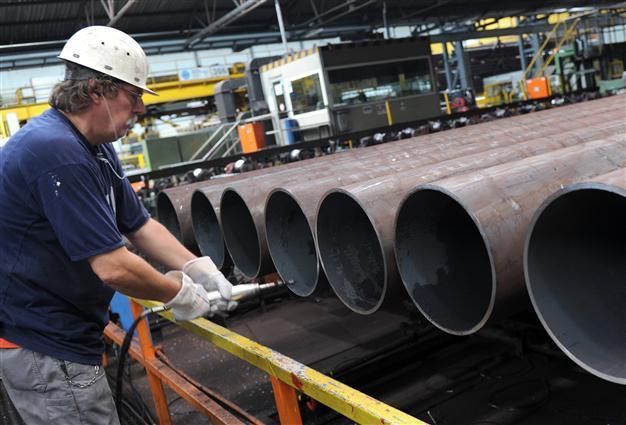Faltering Germany casts cloud over fragile eurozone
BRUSSELS - Reuters

In this July 9, 2013 file picture an employee checks a steel pipe in the manufacturing hall at Vallourec and Mannesmann in Duesseldorf, Germany. AP Photo
Germany’s faltering economy has cast further doubt over the eurozone’s prospects for recovery this year, with no other big country strong enough to pick up the slack.Since late last year, the 18 countries using the euro have been climbing steadily out of a two-year recession. But just as the bloc appeared to be turning the corner, its star economy, Germany, has fumbled the ball.
To make matters worse, other big states, including the eurozone’s second-largest economy France, show little prospect of a strong rebound.
French industrial production plunged unexpectedly in May, and inflation fell to its lowest level since the financial crisis in 2009. Adding to the gloom, Italy’s factories also saw a 1.2 percent drop in output in May, the steepest fall in more than a year and a half.
And while Spain is expecting growth to accelerate to near 2 percent in 2015, one in four of Spain’s workforce are out of work after the collapse of a property price bubble.
“Europe is getting more and more Japanese,” said Carsten Brzeski, an economist with ING, echoing concerns of others that the region faces permanent slow growth and no price inflation.
“The eurozone is flat lining. I don’t see substantial growth for another year.”
Choking exports
At the start of 2014, the picture looked different.
Throughout the first three months, the German economy grew at its strongest rate in three years - 0.8 percent - thanks in part to mild weather lifting construction work.
That made up for stagnation or slowdown in France, Italy and the Netherlands and prevented the bloc’s overall recovery from stalling.
While Britain, outside the bloc, underlined its robust recovery with the strongest quarterly growth in four years - to end June - the mood is turning in continental Europe’s industrial powerhouse. German exports, imports, industrial orders, output and retail sales all fell in May compared with a month earlier.
Yesterday, Germany’s economy ministry cautioned about the impact of the crisis in Ukraine on confidence in Germany as it painted a bleak picture of the second quarter.
“After a growth-strong start to the year, the development of the German economy in the second quarter is subdued,” the report said.
Across the whole eurozone, analysts expect growth in the second quarter at around 0.2 percent, quarter on quarter, as seen in the three months to March.
In the boardrooms of Germany’s Mittelstand, the small and medium-sized companies that employ about 70 percent of its workforce, the sense of nervousness is palpable.
Some economits expect an improvement later in the year, but few believe Germany’s economic muscle can this time pull its neighbors from the trough.
There is a wider debate across Europe about whether to shift the policy focus towards spending to lift the economy and away from spending cuts and austerity.
Italy’s Prime Minister Matteo Renzi is leading a drive for greater flexibility in the way European budget rules are applied, whereas Germany wants to keep the focus on thrift.
But for some, that debate glosses over a deeper problem that holds back the euro zone economy - a reluctance to change.
















